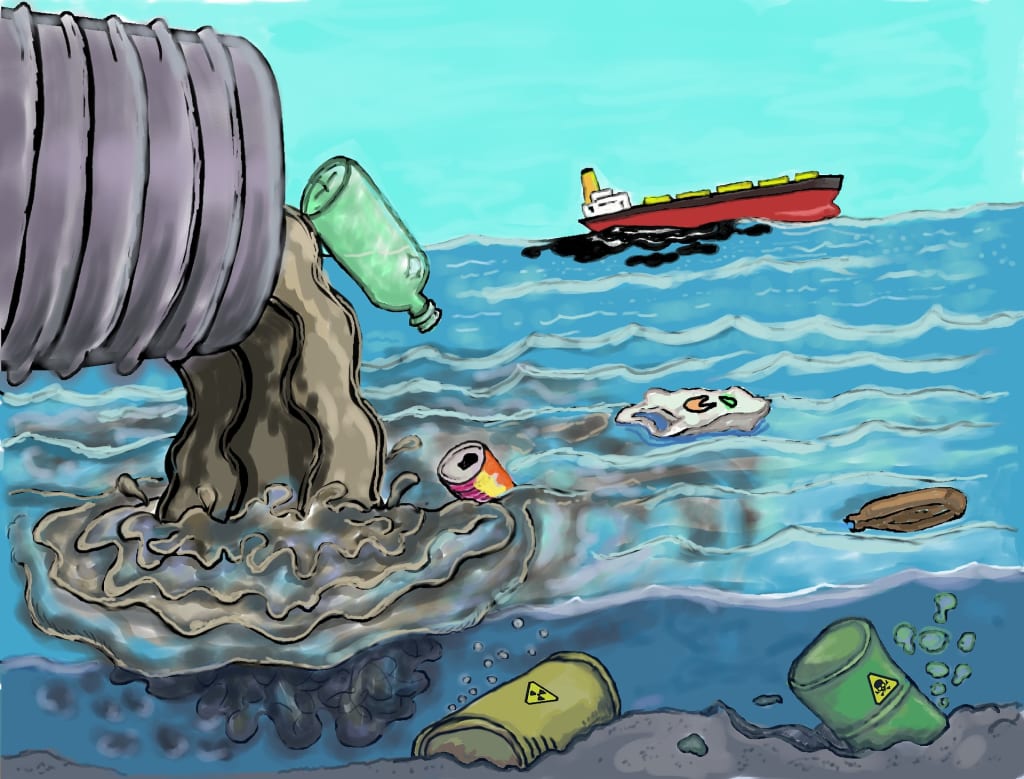
Water pollution is the contamination of water bodies such as lakes, rivers, oceans, and groundwater by human activities. The quality of water is essential for the survival of all living organisms. However, the increase in population and human activities has resulted in significant degradation of water quality, leading to a threat to human and aquatic life. This essay will discuss the causes, effects, and solutions to water pollution.
Causes of Water Pollution:
Industrial waste: Industries produce a lot of waste materials that are discharged into water bodies. This waste contains harmful chemicals, heavy metals, and other pollutants that contaminate water, making it unfit for human consumption.
Agricultural activities: Farmers use a lot of fertilizers, pesticides, and herbicides to increase crop yields. These chemicals are washed away by rain and end up in nearby water bodies. The chemicals not only contaminate the water but also kill aquatic life.
Oil spills: Accidents such as oil spills from ships and oil rigs cause massive damage to marine life. The oil covers the surface of the water and prevents the entry of sunlight, affecting the survival of aquatic plants and animals.
Sewage discharge: Human waste and other sewage materials are dumped into water bodies, contaminating the water with bacteria and viruses that cause diseases such as cholera, typhoid, and dysentery.
Plastic waste: Plastic waste is one of the most significant contributors to water pollution. Plastic takes hundreds of years to decompose, and as a result, it ends up in water bodies, polluting the water and killing marine life.
Effects of Water Pollution:
Health problems: Water pollution leads to the spread of waterborne diseases, which cause illnesses and even death. People who drink contaminated water are at risk of contracting diseases such as cholera, typhoid, and dysentery.
Destruction of aquatic life: Water pollution has a devastating effect on aquatic life. Chemicals and waste materials discharged into water bodies kill fish, dolphins, turtles, and other marine life, leading to a reduction in their population.
Reduced water availability: Pollution of water sources reduces the availability of clean water for human consumption, agriculture, and industrial activities.
Economic impact: Water pollution affects the economy by causing damage to fishing and tourism industries. When water bodies are contaminated, people cannot fish or swim, leading to the closure of fishing and tourism industries, which rely on clean water.
Climate change: Water pollution contributes to climate change by increasing the concentration of greenhouse gases in the atmosphere. When water bodies are polluted, they release methane and other harmful gases that contribute to global warming.
Solutions to Water Pollution:
Reduction of plastic waste: Governments should ban the use of plastic bags, straws, and other plastic products that contribute to water pollution. People should also be encouraged to recycle plastic waste.
Proper waste disposal: Industries should treat their waste materials before discharging them into water bodies. Farmers should use organic fertilizers and pesticides that do not harm aquatic life. Governments should also provide proper waste management facilities for household waste.
Protection of water bodies: Governments should create laws that protect water bodies from pollution. Industries and farmers who violate these laws should be penalized.
Water conservation: People should be encouraged to conserve water to reduce the demand for water sources. Water conservation techniques such as rainwater harvesting should be promoted.
Use of clean energy: The use of clean energy such as solar and wind power can reduce the emission of greenhouse gases that contribute to water pollution.
Conclusion:
In conclusion, water pollution is a serious problem that affects the health of humans and aquatic life. Industries, farmers, and individuals should take responsibility for reducing water pollution. Governments should create laws that protect water bodies and provide proper waste management facilities






Comments
There are no comments for this story
Be the first to respond and start the conversation.